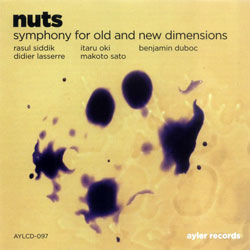
Bassist Duboc's two part symphony with dual drummers and dual trumpeters is a journey that aims at the creative free improvisation of groups like the Art Ensemble, AACM, BAG, &c.
In Stock
Quantity in Basket: None
Log In to use our Wish List
Shipping Weight: 5.00 units
EU & UK Customers:
Discogs.com can handle your VAT payments
So please order through Discogs
Sample The Album:
Benjamin Duboc-bass
Rasul Siddik-trumpet, flugelhorn, seeds, objects
Itaru Oki-trumpet, flugelhorn, flutes, tubes
Didier Lasserre-drums
Makoto Sato-drums
Click an artist name above to see in-stock items for that artist.
UPC: 7320470068373
Label: Ayler
Catalog ID: aylCD-097
Squidco Product Code: 12063
Format: CD
Condition: New
Released: 2009
Country: France
Packaging: Jewel Tray
Recorded at Le Carre Bleu, in Poitiers, France, on February 5th, 2009.
"When Benjamin Duboc gathered these four men around him, he knew he had to bring forth an underlying intuition - which has become his de facto philosophy, one would say his ideology - that the gathering, the very act of gathering individuals was the key of musicmaking today. Today, the dreary naughties, times typified by the endless recycling of worn-out concepts of fusion, cross-breeding of jazz and "world music" (whatever it is), odd revivals. A decade that went lost after the realization of a broader loss, that of the individual. There's no center anymore. It lies upon the musician to - do the job. More so than the energy to create won't be instillated by outside routines or the public's reaction: the public in 2009 is waiting for no one.
There's no center anymore, like we said: from the beginning, Benjamin Duboc's answer, his whole praxis has revolved around the notion of context. Context. A set of circumstances or facts that surround a particular event. Let's not think in terms of "gig" or "session", as we are dealing with music, let's think in terms of "event". What's interesting is that a praxis built on parameters rather than definitions allows a shifting center, the music radiating from this center to reach its own boundaries, space- and time-wise, which it actually creates. Even the way we look at free jazz is blurred by jargon, clichés. In/Out. Shadow/Light. Rules/Freedom. Metaphors upon metaphors trying to describe the sound - there's a word for instance we read everywhere, "texture". The sound of free jazz is supposed to be "aggressive", "uneven", as opposed to the politeness and regularity implied by the historical relationship between free jazz and the previous jazz forms. What comes to mind are the "thick" "layers" of sound proponed by the continuous "flow" of improvisation.
NUTS doesn't produce this kind of music, doesn't produce anything that will help our ear to relate to such phraseology. Instead, NUTS rather aims at the improvising teams of the 70s': the AACM, the Art Ensemble of Chicago, BAG (no wonder the trumpet player is Rasul Siddik), NUTS is a playground of gathered individuals caught in the act of meeting each other. Live. Whatever "live" is: gigging, rehearsing, eating pizza together, that's the same. It is agreed in NUTS that the time devoted to make the acquaintance of the guy standing next to your shoulder on stage won't be devoted to create a definitory sound, an identifiable identity in music. We don't want to lose the individual in a transcendental experience of fusion: again, their performing music is contextualized.
The context is of course cultural in the first place. On hand we've got Benjamin Duboc, double bass player, born 1969 in France and Didier Lasserre, drummer, born 1971 in France. Mainstays of what appears to be a "French scene" as witnessed most notably at the Atelier Tampon-Ramier in Paris. Improvisers rather than jazzmen. Interest in Coltrane as well as John Cage. We've got Rasul Siddik, trumpet player, born 1949 in St. Louis. AACM. BAG. Played with Henry Threadgill, Julius Hemphill, Kalaparusha among others. Plays details like no other. Can also kill you with straight bebop. We've got Itaru Oki, trumpet player, born 1941 in Kobe. The "japanese Miles Davis" they said in the 60s'. Not false. Not true. Brought the sound of Shakuhachi and neat japanese engravings in jazz. We've got Makoto Sato, born in Japan too, cannot remember the date, who cares, still in his forties, is that OK? Stalwart of Marteau Rouge with Jean-François Pauvros. Has developed visually incredible gestures when attacking the drums, which also creates incredible rhythm. Context is also micro-tonal.
Take the moment and momentum; the time of day; the venue; the shirt one of them wore the day this here record was done; the psychologial and physical condition of the performers (history won't say if any of them felt his hemorrhoids too bad on that night - but that influes on a performance tons more than being born in Kobe or having listened to Ascension); the physical condition of the instrument. The weather. The meal. Discussions. Enough."-Julien Palomo

The Squid's Ear!
Artist Biographies
• Show Bio for Benjamin Duboc "Benjamin Duboc is a very strong voice on double bass, born 1969, studied with JF Jenny-Clark & Bernard Cazauran, and has played with many great musicians (as Ernest Dawkins, Bertrand Denzler, Roy Campbell, Jean-Luc Cappozzo, Sabir Mateen, Byard Lancaster, Daniel Erdmann, Abdelahaï Bennani, Michel Doneda, Daunik Lazro, Sunny Murray, John Betsch...). And also with Henry Grimes for a great duet in Paris. He leads the "Nuts" quintet with Itaru Oki & Rasul Siddik on trumpets, & Makoto Sato & Didier Lasserre on drums. He plays in "The fish" with Jean-Luc Guionnet on alto sax & Edward Perraud on drums (double cd on Ayler Records) and Rocks in the Sea with Mario Rechtern, Eric Zinman and Didier Lasserre. Benjamin has a beautiful and big sound, you really feel the ground while hearing him... it's somethin' ! He also is recorded on Amor Fati, Futura Marge, Creative sources, le petit label, sansbruit." ^ Hide Bio for Benjamin Duboc • Show Bio for Itaru Oki "Itaru Oki (沖至) was born in Suma-Ku, Kobe, Hyogo, Japan on 10th September 1941. Oki Itaru was raised in a rich musical environment; his father was a player of the Shakuhachi (Japanese vertical flute) and his mother was a master of the Koto (Japanese horizontal harp) of the Ikuta School. He started to play the trumpet in his high school brass band before playing in a Dixieland style band and then in a bop band. In the late 1960's, the trumpeter began playing free jazz. He changed his place of performance from Kansai (a western area of Japan) to Tokyo in 1965. After improving his skill in many groups, he joined an experimental unit "ESSG" of Togashi Masahiko and Sato Masahiko. Oki made his first tour to Europe with the ESSG in 1969. After being back from Europe, he formed the Oki Itaru Trio, which later grew into a quartet. In June 1974, he moved to Paris, France. After living in Lyon for a while, he moved back to Paris in December 1999. Until the present, Oki has continually performed at concerts and festivals in France and various other countries in Europe." ^ Hide Bio for Itaru Oki • Show Bio for Didier Lasserre "Didier Lasserre was born in Bordeaux, France, 1971. Started the drums at the age of sixteen, in order to live something else. After learning some drums rudiments in the local music school, he works essentially in autodidact, in order to find his own voice. Teaches drums and leads improvision workshop. Works with painting, poetry, dance, super8, photography. Has played through Europe, Russia, Argentina. Has recorded around 30 records (Amor fati, Dark Tree records, Ayler records, Improvising beings, No business records...) BANDS: Solo (drums or percussion); "Ceremony" with Jean-Luc Cappozzo; "Ici en deux" with Michel Doneda; "Out !" with Jean-Luc Guionnet; "Soft Eyes" with Raymond Boni; "Hors ciel" with Beñat Achiary; "Twigs" with Thierry Waziniak; "Pourtant les cimes" with Daunik Lazro & Benjamin Duboc; "Noise Poetry" with Mathias Pontevia & David Chiesa; "The rich horn" with Paul Rogers & Jean-Luc Cappozzo; Trio with Jean-Luc Cappozzo & Daunik Lazro ( cd on Ayler records, 2017); Group4 with Jean-Luc Guionnet, David Chiesa & Lionel Marchetti); "Délivrance" (Cie Translation); "Ensemble UN" " ^ Hide Bio for Didier Lasserre • Show Bio for Makoto Sato Drummer Makoto Sato has been a member of Marteau Rouge, Nuts, and has recorded with Joe McPhee, Marteau Rouge, Evan Parker, Nuts (Benjamin Duboc, Rasul Siddik, Itaru Oki, Didier Lasserre, Sato), Linda Sharrock, Itaru Oki, Mario Rechtern, Makoto Sato, Eric Zinman & Yoram Rosilio. ^ Hide Bio for Makoto Sato
7/1/2025
Have a better biography or biography source? Please Contact Us so that we can update this biography.
7/1/2025
Have a better biography or biography source? Please Contact Us so that we can update this biography.
7/1/2025
Have a better biography or biography source? Please Contact Us so that we can update this biography.
Have a better biography or biography source? Please Contact Us so that we can update this biography.
Track Listing:
1. Move One: Paths 24:05
2. Movement Two: Fields 43:04
Ayler Records
Improvised Music
Jazz
2009 Top Sellers
Quintet Recordings
Objects and Home-made Instruments
Instant Rewards
Search for other titles on the label:
Ayler.


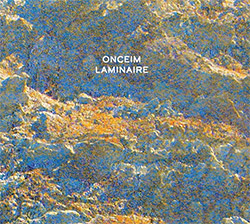

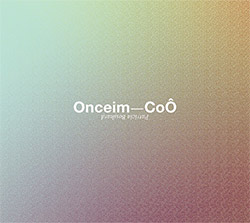


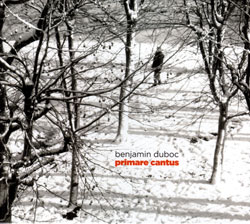
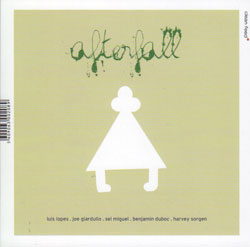
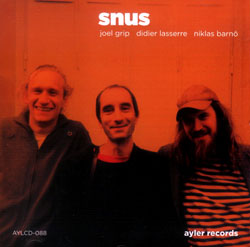
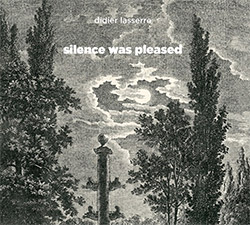
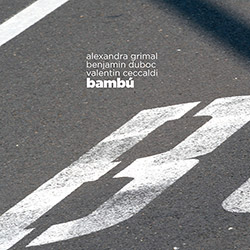



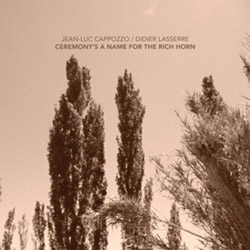
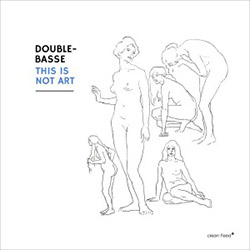
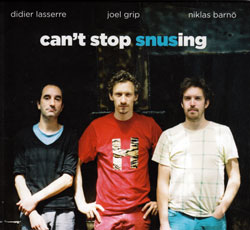
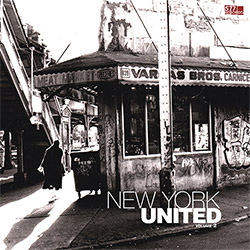

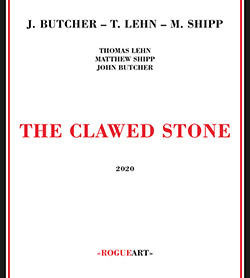
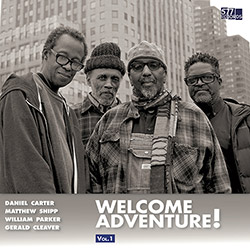
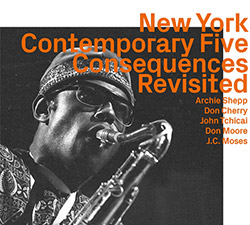
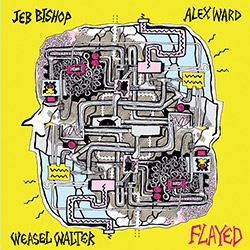
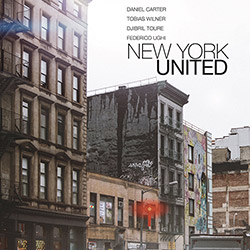
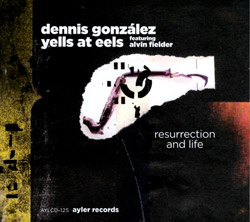
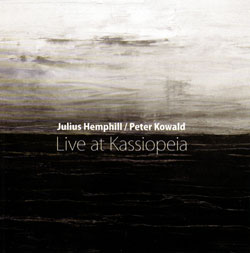










![Deupree, Jerome / Sylvie Courvoisier / Lester St. Louis / Joe Morris: Canyon [2 CDs]](https://www.teuthida.com/productImages/misc4/36404.jpg)


![Eternities: Rides Again [CASSETTE]](https://www.teuthida.com/productImages/misc4/36247.jpg)

![Lopez, Francisco: Untitled (2021-2022) [2 CDs]](https://www.teuthida.com/productImages/misc4/36438.jpg)




![Eventless Plot | Haarvol: The Subliminal Paths [CASSETTE + DOWNLOAD]](https://www.teuthida.com/productImages/misc4/36232.jpg)












![Eventless Plot | Francesco Covarino: Methexis [CASSETTE + DOWNLOAD]](https://www.teuthida.com/productImages/misc4/36231.jpg)



![Das B (Mazen Kerbaj / Mike Majkowski / Magda Mayas / Tony Buck): Love [VINYL]](https://www.teuthida.com/productImages/misc4/36329.jpg)



![Hemphill Stringtet, The: Plays the Music of Julius Hemphill [VINYL]](https://www.teuthida.com/productImages/misc4/36409.jpg)



![Halvorson, Mary Septet: Illusionary Sea [2 LPS]](https://www.teuthida.com/productImages/misc4/17952.jpg)






![Money : Money 2 [2 CDs]](https://www.teuthida.com/productImages/misc4/35894.jpg)




![Klinga, Erik: Elusive Shimmer [VINYL]](https://www.teuthida.com/productImages/misc4/36258.jpg)
![CHANGES TO blind (Phil Zampino): Volume 9 - I Wave on a Fine Vile Mist [CD + DOWNLOAD]](https://www.teuthida.com/productImages/misc4/36061.jpg)

![Wallmart / Rubbish: Asset Protection [split CD]](https://www.teuthida.com/productImages/misc4/35900.jpg)


![+Dog+: The Family Music Book Vol. 5 [2 CDs]](https://www.teuthida.com/productImages/misc4/35897.jpg)
![Kuvveti, Deli : Kuslar Soyledi [CASSETTE w/ DOWNLOAD]](https://www.teuthida.com/productImages/misc4/36107.jpg)

![Nakayama, Tetsuya: Edo Wan [CASSETTE w/ DOWNLOAD]](https://www.teuthida.com/productImages/misc4/36105.jpg)




![Yiyuan, Liang / Li Daiguo: Sonic Talismans [VINYL]](https://www.teuthida.com/productImages/misc4/35957.jpg)
![Brown, Dan / Dan Reynolds: Live At The Grange Hall [unauthorized][CASSETTE]](https://www.teuthida.com/productImages/misc4/36245.jpg)








![Palestine, Charlemagne / Seppe Gebruers: Beyondddddd The Notessssss [VINYL]](https://www.teuthida.com/productImages/misc4/36206.jpg)
![Palestine, Charlemagne / Seppe Gebruers: Beyondddddd The Notessssss [NEON GREEN VINYL]](https://www.teuthida.com/productImages/misc4/36207.jpg)

![Laubrock, Ingrid: Purposing The Air [2 CDs]](https://www.teuthida.com/productImages/misc4/35639.jpg)

![Yoko, Ono / The Great Learning Orchestra: Selected Recordings From Grapefruit [2 CDs]](https://www.teuthida.com/productImages/misc4/35841.jpg)









![Zorn, John / JACK Quartet: The Complete String Quartets [2 CDs]](https://www.teuthida.com/productImages/misc4/35609.jpg)

![Lonsdale, Eden: Dawnings [2 CDs]](https://www.teuthida.com/productImages/misc4/35480.jpg)



![Sorry For Laughing (G. Whitlow / M. Bates / Dave-Id / E. Ka-Spel): Rain Flowers [2 CDS]](https://www.teuthida.com/productImages/misc4/35985.jpg)

![Rolando, Tommaso / Andy Moor : Biscotti [CASSETTE w/ DOWNLOADS]](https://www.teuthida.com/productImages/misc4/36106.jpg)


![Electric Bird Noise / Derek Roddy: 8-10-22 [CD EP]](https://www.teuthida.com/productImages/misc4/35970.jpg)








![Elephant9 : Mythical River [VINYL]](https://www.teuthida.com/productImages/misc4/34624.jpg)



![Elephant9 with Terje Rypdal: Catching Fire [VINYL 2 LPs]](https://www.teuthida.com/productImages/misc4/35355.jpg)
![Deerlady (Obomsawin, Mali / Magdalena Abrego): Greatest Hits [VINYL]](https://www.teuthida.com/productImages/misc4/34876.jpg)







![Surplus 1980: Illusion of Consistency [CD]](https://www.teuthida.com/productImages/misc4/35069.jpg)
![Staiano, Moe: Away Towards the Light [VINYL + DOWNLOAD]](https://www.teuthida.com/productImages/misc4/35037.jpg)
![Coley, Byron: Dating Tips for Touring Bands [VINYL]](https://www.teuthida.com/productImages/misc4/17906.jpg)

![Lost Kisses: My Life is Sad & Funny [DVD]](https://www.teuthida.com/productImages/misc4/lostKissesDVD.jpg)